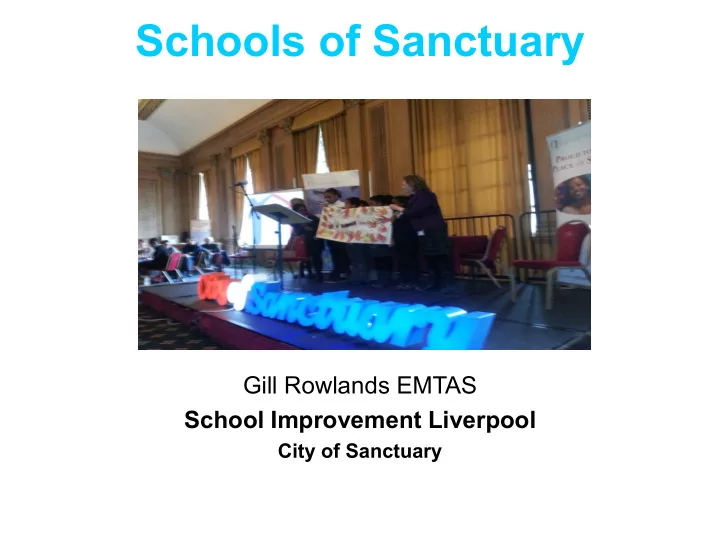

Schools of Sanctuary Gill Rowlands EMTAS School Improvement Liverpool City of Sanctuary
Edinburgh Newcastle 38 groups Exeter Nottingham Glasgow Oxford Bedford and Luton Gloucester Sheffield Belfast Hackney Southampton Birmingham Halifax Sunderland Bradford Huddersfield Swansea Brighton Hull Tees Valley Bristol Ipswich Wakefield Cardiff Leeds Wolverhampton Coleraine / Causeway Leicester York Coventry Lincoln Derby Liverpool Derry Loughborough Dublin Manchester moved from being dispersed groups to a cohesive network with a focus on both local and national culture change
Streams of Sanctuary Maternity Welcome Health Schools Arts Faith
School of Sanctuary award • Engage families and communities 1. Learn 2. Embed 3. Share • Celebration and opportunity for reflective learning • Written evidence • Sanctuary seekers support with learning –stimulating lessons • Evaluation by appraisal group and presentation at award ceremony
Asylum seekers and refugees as volunteers • “Asylum Seekers and Refugees (AS&R)the least likely people to become volunteers but the most likely if asked” • Peer to Peer support – “don’t want others to suffer as we have suffered.” • AS&R heart of City of Sanctuary – work with and not for • Key to awards – awareness raising, part of design and appraisal group • Emily’s story
What is Schools of Sanctuary? A school of Sanctuary is a school that is committed to being safe and welcoming place for those seeking sanctuary. An award from City of Sanctuary to celebrate and encourage good practice in schools
Who is a refugee? • An asylum seeker is A person who has fled persecution in their country and has made a claim to seek international protection somewhere else. (N.B. claiming asylum is a human right.) • A refugee is A person whose asylum claim was successful, because she has “a well- founded fear of being persecuted” if she goes home. Not to be confused with Economic Migrant/ Illegal Immigrant
Asylum in the UK • The UK continues to host just over 1% of the world’s 16.7 million refugees.(UNHCR 2014) • 49% of refugees are women, whilst 50% are under the age of 18. 0.32% of UK population are refugees • • The main host countries in 2013 were: Pakistan, Iran, and Lebanon (neighbouring countries) • Major source countries of refugees in UK in 2013:Pakistan, Iran and Sri Lanka –many from Syria, Bangladesh, India, Albania, Afghanistan, Nigeria and Eritrea.
Three simple principles Learn Embed Share
Learn • Invite refugee speakers to tell their stories • Use resources to create activities in lessons • Invite facilitators to deliver workshops to staff
Embed: Take a positive action • Displays and activities • Support a charity • Campaign • Everyday life
Share Other members of staff Parents Other schools The wider community
The resource pack
Why get involved? • Make your school a happier school • Meet OfSTED requirements to promote equality and diversity • Address Public Sector Equality Duty (PSED) • Develop community cohesion work within the school • Increase the student voice and promote active citizenship • Strengthen the school’s role in the community • Provide learning opportunities around asylum issues, human rights and social justice
How can I get involved? • Visit our website - www.cityof sanctuary .org/ schools • Read the resource pack and share with your colleagues and head-teacher • Contact your local school of sanctuary group for information and support. Meet the 3 principles, Learn, Embed and Share – follow our • suggestions or carry out activities of your own. Submit evidence that you have met the principles. • Be presented with an official School of Sanctuary certificate. •
The Future For Schools of Sanctuary More Schools involved • Partnership work with Oxfam • Young Ambassadors groups National schools discussion group • Promote Schools of Sanctuary to • City of Sanctuary groups in UK and at national school seminars or conferences Host a National Schools of • Sanctuary conference Make schools a happy place for • ALL children!
What can a School of Sanctuary Do? –Lawnswood School?
The Liverpool Journey • Background • Where are we now? • Why?
Recommend
More recommend